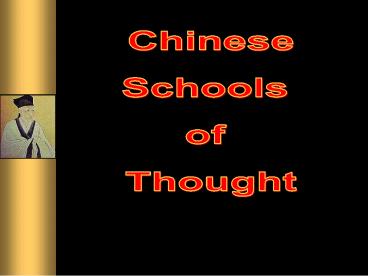CHinese Philosophies - PowerPoint PPT Presentation
1 / 20
Title:
CHinese Philosophies
Description:
Title: CHinese Philosophies & Ethical Codes Author: Susan M. Pojer Last modified by: jkline1 Created Date: 4/19/2003 7:57:02 PM Document presentation format – PowerPoint PPT presentation
Number of Views:263
Avg rating:3.0/5.0
Title: CHinese Philosophies
1
Chinese Schools of Thought
2
Daoism
3
Lao Zi Lao-Tzu
- Not sure when he died. 604 B.C.E. - ?
- His name means Old Master
4
Major Daoist Principles
1. Dao Tao is a force that flows through
all life. 2. A believers goal is to become one
with Dao one with nature. 3. --gt Let nature
take its course. --gt Go with the flow! 4.
Man is unhappy because he lives according to
man-made laws, customs, traditions that are
contrary to the ways of nature.
5
The "Dao" Tao
To escape the social, political, cultural
traps of life, one must escape by
1. Rejecting formal knowledge and learning.
2. Relying on the senses and instincts. 3.
Discovering the nature and rhythm of the
universe. 4. Ignoring political and social laws.
6
The Dao De Jing
- The book. Written during the Zhou Dynasty.
- Many Chinese artists, including poets, painters,
calligraphers, and even gardeners have used the
Daodejing as a source of inspiration.
7
The Universe of Opposites Find the Balance!
Yin
- Masculine
- Active
- Light
- Warmth
- Strong
- Heaven Sun
- Feminine
- Passive
- Darkness
- Cold
- Weak
- Earth Moon
Yang
8
Confucianism
9
Confucius
- Kong Fu Zi
- 551 479 B.C.E.
- Became a teacher and editor of books.
- Lived during a time of chaos. Wanted to help.
10
Major Confucian Principles
- Foundation of Chinese culture
- Strong family loyalty If the family is strong,
the government will be strong - Patriarchal Society
- FILIAL PIETY Respect of elders by their children
- Golden Rule "Do not do to others what you do not
want done to yourself"
11
5 Principle Relationships
- The person on the left gets all of the respect
and honor from the one on the right
1. Ruler
Subject
2. Father
Son
3. Husband
Wife
4. Older Brother
YoungerBrother
YoungerFriend
5. Older Friend
- These relationships organize society and maintain
order. - KNOW YOUR ROLE!!
12
The Analects
- A collection of concise statements, which was
compiled many years after his death. - Made the official philosophy and required reading
for civil service examinations during the Han
Dynasty in 140 BC. - It continued, nearly unbroken, until the end of
the 19th Century.
13
Sayings from The Analects
- Knowing what he knows and knowing what he
doesnt know, is characteristics of the person
who knows. - Making a mistake and not correcting it, is
making another mistake. - The superior man blames himself the inferior
man blames others. - To go too far is as wrong as to fall short.
14
Confucius' Tomb
15
Differences in Cultures
INDIA
CHINA
1. Brahmin
1. Scholar-Gentry
2. Kshatriyas
2. Peasants
3. Vaishyas
3. Artisans
4. Shudras
4. Merchants
Untouchables
Soldiers
Imperial Nobility
Domestic Slaves
16
Legalism
17
Han Fe Zi
- 280? - 233 B.C.E.
- Lived during the late Warring States period.
- Legalism became the political philosophy of the
Qin Chin Dynasty. - Supported by Emperor Shi Hunag Di
18
Major Legalist Principles
1. Human nature is naturally selfish. 2.
Intellectualism and literacy is discouraged.
3. Law is the supreme authority and replaces
morality. 4. The ruler must rule with a
strong, punishing hand. 5. War is the means
of strengthening a rulers power.
19
Authoritarian
One who favors the principle that individuals
should obey a powerful authority rather than
exercise individual freedom.
The ruler, therefore, cracks his whip on the
backs of his subjects!
20
How is a man to live in a world dominated by
chaos, suffering, and absurdity??
Confucianism --gt Know your role in society and
order will come.
Legalism --gt Rule by harsh law order.
Daoism --gt Freedom for individuals and
less government to avoid
uniformity and conformity.































